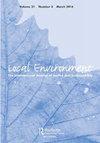社区粮食种植如何建立社区纽带?来自基层视觉叙事的见解
IF 2.8
3区 环境科学与生态学
Q3 ENVIRONMENTAL STUDIES
引用次数: 0
摘要
社区食物种植(CFG)通过情感依恋建立社区纽带和场所。这一过程被草根的视觉叙事所照亮,CFG的参与者用短片讲述他们的经历。这些故事激发了社区建设的灵感,以实现更美好的未来,从而鼓励更多的人支持和参与CFG。对这些故事进行分析,以阐明中影的社会基础和角色。参与者的故事突出了一些关键方面,即:围绕粮食种植、烹饪、食用和分配的团结互助关系;集体应对共同困难的合作、创造和适应能力;不同差异(如种族、年龄和先前的技能)的参与者之间的同理心联系;加强参与者对健康食品的知识和供应的饮食文化;以及促进和激励这些群体实践的社会组织技能。正如这些视频故事所显示的那样,社区建设过程是充满希望的:他们承认不同的邪教问题和情感,以及对不同未来的渴望。这些角色加在一起有助于加强更多参与者的地方依恋。此外,通过筛选视频故事,参与者使这一过程更加引人注目和吸引人。这为确定模范做法、扩大其优势、传播社会效益和吸引更多承诺提供了更坚实的基础。尽管许多城市和城郊空间都有可能用于扩展CFG,但成功的举措取决于社会组织技能,以促进志愿者之间的自信、移情合作和地方依恋。地方当局的支持措施通常分散在几个政策领域,因此需要整合。社区建设技能可以为围绕CFG倡议的多重角色和利益的政策整合提供一个重点。本文章由计算机程序翻译,如有差异,请以英文原文为准。
How does community food growing build community bonds? Insights from grassroots visual storytelling
Community food growing (CFG) builds community bonds and placemaking through emotional attachments. This process has been illuminated by grassroots visual storytelling, whereby CFG participants made short video stories about their experiences. The stories inspired community-building for better futures so as to encourage greater support for and participation in CFG. These stories were analysed to illuminate the social basis and roles of CFG. Participants ” stories highlight some key aspects, namely: solidaristic mutual-aid relationships around food-growing, cooking, eating and distribution; cooperative, creative, adaptive capacities for collectively responding to common di ffi culties; empathetic bonds among participants across various di ff erences (such as ethnicity, age and prior skills); a food culture strengthening participants ’ knowledge and supply of healthy food; and the social-organisational skills for facilitating and inspiring those group practices. As these video stories show, community-building processes are radically hopeful: they acknowledge di ffi cult issues and emotions, alongside aspirations for a di ff erent future. Together those roles helped to strengthen place-attachments for more participants. By screening the video stories, moreover, participants have made the process more visible and attractive. This provides a stronger basis to identify exemplary practices, extend their strengths, spread the societal bene fi ts and attract greater commitments. Although many urban and peri-urban spaces are potentially available for expanding CFG, successful initiatives depend on social-organisational skills to facilitate self-con fi dence, empathetic cooperation and place attachments among volunteers. Support measures from Local Authorities are generally fragmented across several policy areas and so warrant integration. Community-building skills can provide a focus for such policy integration around the multiple roles and bene fi ts of CFG initiatives.
求助全文
通过发布文献求助,成功后即可免费获取论文全文。
去求助
来源期刊

Local Environment
Environmental Science-Management, Monitoring, Policy and Law
CiteScore
4.10
自引率
4.20%
发文量
88
期刊介绍:
Local Environment: The International Journal of Justice and Sustainability is a refereed journal written by and for researchers, activists, non-governmental organisations, students, teachers, policy makers and practitioners. Our focus is specifically on sustainability planning, policy and politics in relation to theoretical, conceptual and empirical studies at the nexus of equity, justice and the local environment. It is an inclusive forum for diverse constituencies and perspectives to engage in a critical examination, evaluation and discussion of the environmental, social and economic policies, processes and strategies which will be needed in movement towards social justice and sustainability - "Just Sustainabilities" - at local, regional, national and global scales.
Please note that we only accept submissions that share our focus. Based on critical research and practical experience, we are particularly seeking submissions from nations and continents representing different levels of income and industrial development and from countries in transition in order to engage in mutual learning and understanding.
 求助内容:
求助内容: 应助结果提醒方式:
应助结果提醒方式:


